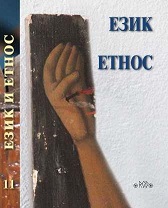Плющят победни знамена (Прочит на историята на 22. пехотен Тракийски полк)
Victorious flags are flapping (A perusal of the story of 22nd infantry Regiment of Thrace)
Author(s): Todor MarinchevSubject(s): Anthropology
Published by: Асоциация за антропология, етнология и фолклористика ОНГЬЛ
Summary/Abstract: The author talks about the influence of ‘The Story of the 22nd Regiment of Thrace’, a book he has bought at the open-air market of Dimitrovgrad. He does it in the light of his own memories of his military service in the nonexistent yet regiment and in the light of the biography of Debelianov. The militia of Eastern Rumelia was formed in 1879. It consisted of the Ninth Battalion of Harmanli and the Tenth Battalion of Haskovo (with parts of which after the Union of the Principality of Bulgaria and Eastern Rumelia the Tenth Infantry Regiment of Rodopi was formed). In 1889 the regiment was renamed the 22nd of Thrace and was billeted in Haskovo, Tatar-Pazardjik, and Peshtera. In 1903 it left the 2nd Division of Thrace and entered the 7th Division of Rila. It was accommodated in Samokov and connected its development to this town. During The First Balkan War the 22nd Regiment of Thrace fought in the theatre of war in Macedonia and in Eastern Thrace at Bulair, where it achieved its greatest military success. The battle, extolled as dismal failure of the Turkish glory, happened on 26th January 1913. During the War between the Alies in 1913 the regiment fought bravely at Kaliman Heights. Afterwards a fund called Kalimanitsa was established and a community centre – memorial in Samokov was built with its resources. The First World War sent the 22nd Regiment back to the theatre of war in Macedonia where exceptional heroism in battle was shown. The whole course of Dincho Velev Debelianov’s life and his poetical way found their majestic end namely in the 22nd Regiment. He was born in Koprivshtitsa and he lived there until he was nine. He also lived in Plovdiv, Ihtiman, Samokov and Sofia. The poet can’t be stamped as a pauper or homeless. He had an enviable education, he also had an excellent command of foreign languages and he could rely on the help of some high-ranking relatives. He studied law, literature and history. He did well-paid jobs at the municipality of Sofia, the Parliament, and the Chamber of Accounts. He was known to be a reveler and a bohemian. Whereas his first poetic attempts bore the mark of a foreign influence, Debelianov’s poems from the time of the First World War are defined as his best poetry and as a beginning of the new Bulgarian poetry. These verses were written at the front when he was in the 22nd Regiment of Thrace. Debelianov had been connected to the regiment for any length of time since 1912, at first as a soldier and then in 1914 as an army officer. Debelianov perished heroically in battle on 2nd October 1916. In the annals of the 22nd Regiment of Thrace he is described as “a brave and selfless officer and an exuberant and ardent patriot“.
Journal: Годишник на Асоциация за антропология, етнология и фолклористика »Онгъл«
- Issue Year: 2013
- Issue No: 11
- Page Range: 196-209
- Page Count: 14
- Language: Bulgarian
- Content File-PDF

